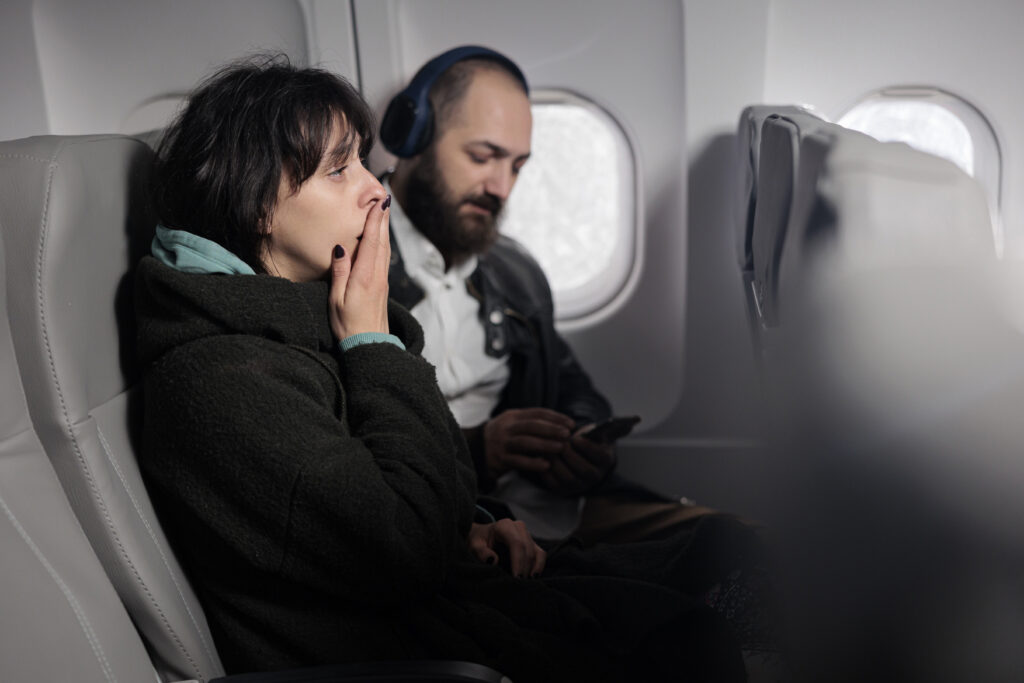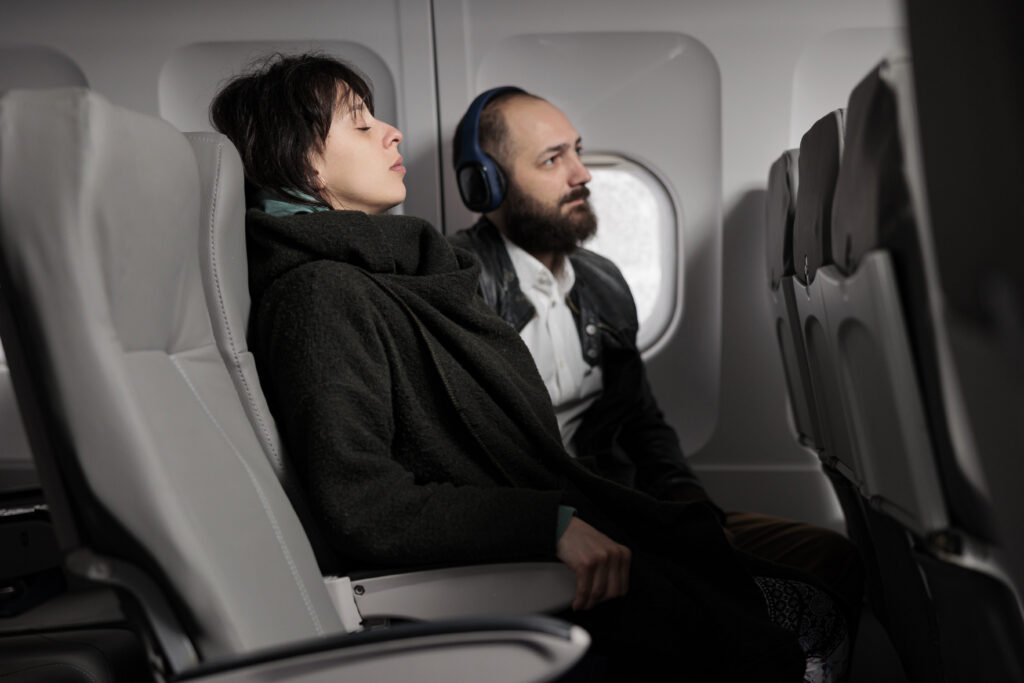Introduction
Jet lag, also called desynchronosis, is a temporary problem but can interfere with your day in many ways. Jet lag is a common sleep problem when you travel across more than three time zones and your body’s natural clock, or circadian rhythm, is disrupted. This temporary sleep condition affects your energy and makes you feel out of sorts along with the appearance of specific symptoms like insomnia or headaches. Your body is designed for a 24-hour cycle. This internal clock directs your body’s specific functions including regulating your body’s temperature and releasing specific hormones. It can cause lethargy, upset stomach, tiredness, or drowsiness. These symptoms aren’t hazardous, but they are damaging for your well-being. Taking steps to prevent it, can help you ensure this ordinary problem may not disrupt your next tour.
Is Jet Lag Worse Going East or West?
Professionals of the medical department have concluded that flying eastward may cause more severe symptoms than flying toward the west. They have proposed the idea that your body can adapt more feasible to staying up late than going to bed earlier than usual.
How Common is Jet Lag?
Many people experience Jet lag when traveling. So it’s a common issue but people experience jet lag in different ways and with varying degrees, such as children do not even notice any problems while adapting to a new time zone.
Causes of Jet Lag
It usually happens when you travel by plane in more than three time zones. Its symptoms appear when your body’s natural rhythm is out of sync with the day- and nighttime hours of your destination. Traveling through a plane makes jet lag worse because your body moves much faster than your brain and circadian rhythms may be disturbed frequently with the time change. Some more aspects of travel can also contribute to jet lag and contribute to make the symptoms worse:
- Long time duration for sitting in the plane
- Decrease the level of oxygen and lower air pressure in the airplane
- Low humidity with warm temperatures is the reason for dehydration
 Your body is naturally set to a circadian rhythm that rotates around a 24-hour cycle and is also known as your sleep-wake cycle. This time gauge is the control center of the rise and fall in your biological processes like your body’s temperature, hormones, and other biological functions. Jet lag disturbs your body’s internal clock for many reasons:
Your body is naturally set to a circadian rhythm that rotates around a 24-hour cycle and is also known as your sleep-wake cycle. This time gauge is the control center of the rise and fall in your biological processes like your body’s temperature, hormones, and other biological functions. Jet lag disturbs your body’s internal clock for many reasons:
1: Disruption of Circadian Rhythm
Your body clock may no longer align with the time in your new location, whenever you travel through a plane. For example, you may fly out of Georgia at 8 p.m. local time and arrive in London at 9 a.m. local time. But your body surely thinks it as, thinks it’s 3 a.m. Now, you’re possibly reaching peak fatigue, you need to stay awake for more than 10 to 12 hours to help your body adjust to the new time zone.
You can prepare your body for the new time zone by sleeping on the plane, but this may be difficult because the temperature, noise, and comfort level are some influential factors that can disturb your sleep during traveling. On the other hand, sleeping too much on the plane due to the lower barometric pressure on planes can also throw off your body clock. This is similar to being on a mountain at a certain height above sea level. A higher quantity of oxygen in the air and the lower pressure in plane may result in less oxygen reaching the bloodstream. Hence, you can understand that lower oxygen levels may make you lethargic, which can induce sleep.
2: Shift in Light Exposure
Getting too much screen time or too much sunlight in the plane while traveling can also affect your internal body clock. Dim light is essential to induce a sleepy feel because the hormone melatonin helps your body get ready to fall asleep. It is released in the brain at night in dimmer light. Melatonin production in your body slows down in brightness, which helps you to awake more.
3: Dehydration and Fatigue
Studies show that travel fatigue is also a main factor in jet lag. No matter from which time zone to which you’re traveling, the variations in the pressure of the plane cabin and altitudes during traveling contribute to worsening the symptoms of jet lag. Some people are affected by altitude and get altitude sickness when traveling on a plane. This can cause worse symptoms of jet lag like nausea, fatigue, or headache.
If you don’t drink enough water during your flight, you may feel slightly dehydrated. Dehydration may contribute to symptoms of jet lag. Moreover, low levels of humidity in planes can cause more water loss. So keep yourself hydrated during the flight.
4: Use of Coffee and Alcohol
Like other travelers, you may be habitual to enjoy beverages like caffeinated drinks, tea, or coffee on a plane that you may not normally drink in those amounts. These beverages prevent you from getting enough sleep while traveling. Caffeine present in these beverages makes you dehydrated while alcohol induces drowsiness in you but this may worsen the quality of sleep. Alcohol also causes severe symptoms of jet lag including nausea, fatigue, and headache.
5: More Factors that Impact Jet Lag
Traveling by airplane allows you to cross multiple time zones very quickly. It’s a faster way to travel therefore, the more time zones you cross, the more severe your symptoms of jet lag may be. In the past, travelers were more likely to experience more severe symptoms of jet lag than recent time travelers. Young travelers and children have fewer symptoms than older travelers and adjust to the new time more quickly and feasibly.
One more important factor is the direction you’re flying. It also has a big effect on your jet lag symptoms.
Symptoms of Jet Lag
Jet lag occurs when your body’s natural sleep-awake clock is significantly upset by traveling. You may experience severe symptoms of jet lag while traveling by plane and trying to match your body’s natural rhythm to the new time zone. These symptoms usually appear within 12 hours of arriving at your destination, and they may last for many days.
Major symptoms of Jet lag may include:
- Upset stomach
- Mood swings and irritability.
- Drowsiness.
- Lack of focus.
- Extreme tiredness
- Fatigue and headache.
- Insomnia (lack of sleep)irritability
- Feeling slightly disoriented
- Lethargy
- Minor gastrointestinal issues like diarrhea
- Excessive sleepiness
- Feeling confused
Symptoms of jet lag are mild in most cases but If you’re experiencing more severe symptoms, like vomiting, fever, or cold sweating, you may have something else, like altitude sickness, a cold, or a viral invasion. If these symptoms last more than 48 hours, consult with a doctor for treatment.
Managing Jet Lag
The following steps or tips may help you to reduce or prevent the symptoms of jet lag:
1: Snooze on the Plane Always bring earplugs and eye masks to help reduce noise and light so that you may sleep on the plane while traveling eastward. This may help you to reduce the symptoms of jet lag. But if you’re arriving at your destination at night time, try to stay awake for a few hours before you land to avoid headaches or nausea. At this time you can use screen time to rewire your sleep schedule. Instantly go to bed after landing and wake up early in the morning to get acclimatized to the new time zone.
Always bring earplugs and eye masks to help reduce noise and light so that you may sleep on the plane while traveling eastward. This may help you to reduce the symptoms of jet lag. But if you’re arriving at your destination at night time, try to stay awake for a few hours before you land to avoid headaches or nausea. At this time you can use screen time to rewire your sleep schedule. Instantly go to bed after landing and wake up early in the morning to get acclimatized to the new time zone.
2: Select Flight Times Strategically
Choose a flight that allows you to arrive in the evening. This may help you stay up until it’s time for bed in your new time zone.
3: Power Nap
A power nap is an effective way to fulfill your need for sleep If bedtime is too far out and you need a nap. But the duration of a power nap must be 20 to 30 minutes. Sleeping longer than that may prevent sleep later in the night and you may get feelings of insomnia.
4: Plan Extra Days
Arrange your trip wisely and try to arrive at your destination a few days early so you can get used to the time zone before any big event you arrive to attend.
5: Anticipate the Change
Try to get up several hours earlier for a few days before your departure, flying eastward. But do the opposite, while flying westward. Staying awake later and waking up later may help you adjust before you even take off.
6: Don’t Hit the Booze
Avoid alcohol, caffeinated drinks, or beverages the day before and the day of your flight. These drinks can interfere with your internal circadian rhythm and prevent regular sleep. They may induce the symptoms of jet lag.
7: Jet Lag Diet
A balanced diet is an effective way to help reduce some jet lag symptoms like poor sleep, fatigue, bloating, and an upset stomach. So, stay hydrated and add more fresh fruit and vegetables to your diet before and on the day of the flight. Avoid salty and sugary foods while traveling. Also, avoid overeating.
You have to sit for a long time during a flight and It may be difficult to avoid sitting while on a flight, but a slight movement or exercise can help you sleep better. So, keep stretching, whenever you can. Stand up only when it’s safe. If you’re changing flights, keep walking around the airport or stand instead of sitting at your departure gate.
9: Drink Herbal Tea Drink non-caffeinated herbal teas instead of coffee or tea. Research shows that drinking chamomile tea before bed can help improve the quality of sleep.
Drink non-caffeinated herbal teas instead of coffee or tea. Research shows that drinking chamomile tea before bed can help improve the quality of sleep.
Short-Term Aids
Here are a few options for you if the symptoms are bothersome and prevent you from performing your daily tasks. Because Jet lag doesn’t always require treatment, but
1: Sunshine
The sun’s light is a great source of getting your circadian rhythm correct. It informs your body it’s time to be awake. Try to get outside in the sunlight during prime daylight hours once you get to your destination. This can help reset your body’s internal clock and reduce symptoms of jet lag.
2: Light Therapy
Lamps, light boxes, and visors can help reset your body’s sleep-wake cycle. The artificial light simulates your circadian rhythm and helps cue your body to be awake. Once you arrive at your new location, you may use this treatment to help you stay awake during periods of lethargy so your body can better accommodate a new time zone.
3: Melatonin
Melatonin is a hormone that helps to induce sleep at bedtime and it is produced in your body naturally when the lights are off. You can take over-the-counter melatonin supplements to induce sleep when your body feels it difficult to fall asleep easily. Melatonin is an efficient therapy, so take it no more than 20 minutes before you go to sleep. Make sure you have a sleep of almost 7 to 8 hours when you take it. Melatonin can induce drowsy feelings if you wake up before the suggested time.
4: Sleeping Tablets
You may experience insomnia when you travel. You may have difficulty sleeping in new places. Sleeping pills can be taken as a remedy but ask your doctor to prescribe them first because Some of these medications are of high potency and are available as OCT. Your doctor can prescribe the stronger versions if necessary. Be careful while using sleeping tablets as Sleep medication has several side effects.
Maintaining Long-Term Health
1: Eat At Standard Mealtimes.
Researchers have found that altering when you eat can help your body adjust to jet lag. Your body feels hungry at times close to when you would normally eat. Try to ignore those hunger cues. Eat according to time for your new time zone to help your body follow the new cues. The foods you eat can also affect your circadian rhythm and quality of sleep.
2: Take A Hot Bath After landing, take a relaxing hot bath before you go to bed. This can help your body to fall asleep quickly.
After landing, take a relaxing hot bath before you go to bed. This can help your body to fall asleep quickly.
3: Simple Home Remedies
A lot of sleep issues or illnesses can be cured by a good night’s sleep. Take a deep look at the tips jotted below, which, may help you to reduce symptoms of jet lag while traveling:
- Don’t deprive yourself of good sleep before starting your journey. Rest well and keep yourself fresh.
- A light meal a few hours before you plan to go to bed may help you to prevent jet lag.
- Avoid screen time devices like computers, TV, and phone screens for a few hours before you sleep.
- Dimming the lights a few hours before bedtime may help to improve your sleep quality.
- Get a full night of sleep on your first night at the new place.
- Reduce distractions by turning off phones.
- Eliminate noise and light before going to bed by using earbuds, noise machines, and eye masks.
Conclusion
It may take several days for your body to reset the circadian cycle at a new location. A correct alignment of your sleeping, working, and eating schedule can help you reset your body’s internal sleep-wake cycle. However, symptoms of jet lag may appear even after adjusting. This is not something to worry about, these symptoms may end in a few days after your arrival to your new location.
So give yourself time to adjust to the new schedule, so that you may enjoy your trip without jet lag.







